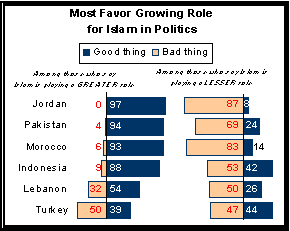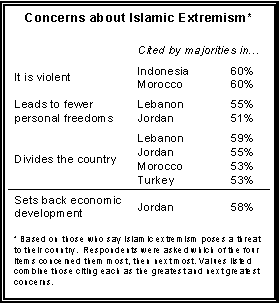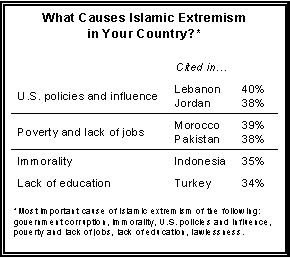
The importance of Islam in the political life of many countries where it is the predominant religion is underscored by the large percentages in these countries saying that they think of themselves first as a Muslim, rather than as a citizen of their particular country.
Large majorities in Pakistan (79%), Morocco (70%) and Jordan (63%) say they self-identify first as Muslims, rather than as Pakistanis, Moroccans or Jordanians. Even in Turkey, with its more secular traditions, a 43% plurality among Muslims identify primarily with their religion rather than their nationality. Indonesians are closely split with 39% self-identifying as Muslims first, 35% as Indonesians and 26% saying both equally. In Lebanon, however, just 30% of Muslims (this question was not asked of Christians) say they view themselves primarily in terms of their faith, rather than as Lebanese.

Islam’s Political Influence
Substantial majorities in all but one of the predominantly Muslim countries surveyed — including as many as 85% in Indonesia and 75% in Morocco — say that Islam plays a very large or fairly large role in the political life of their countries.
The major exception is Jordan; just 30% of Jordanians now see Islam playing a large political role in that country, a sharp decline from the 50% who said so in the summer of 2002.*
In Lebanon as well, those seeing substantial Islamic influence in political life have also declined in number — from 71% in 2002 — but remain in the majority (54%).*

Only in Turkey has the proportion of those seeing a large Islamic political influence increased substantially, from 46% in 2002 to 62% currently.*
*Edited to reflect corrected figures as of 3-3-07.
Further, large majorities in most of these countries welcome the idea of Islam playing a greater role in political life. Here, the exceptions are Turkey, where half of those who see Islam playing a greater role say this as a bad thing; and Lebanon (32% bad thing).
Lebanese Muslims and Christians divide on this issue; Muslims who believe Islam’s political role is increasing are unanimous in thinking this is a good thing, while Christians mostly view this as a negative development (71%).

At the same time, most of those who see Islam playing a lesser role in politics view this as bad for their countries. Turks, however, are narrowly split with 44% considering a reduced role good compared with 47% who call it bad.
Those who see Islam playing a greater role differ as to the reasons for this. In Jordan, a majority (58%) among this group attributes Islam’s larger role in politics to growing immorality in society, as do pluralities in Morocco and Turkey. Indonesians are divided, with a narrow plurality citing growing immorality.

In Pakistan, a 37% plurality says that dissatisfaction with the current government is the most important reason for Islam’s larger role. In Lebanon, a 44% plurality (including 50% of Christian respondents) points to concerns about Western influence.
However, even in some predominantly Muslim countries where support for a politically active Islam is strong, concerns about Islamic extremism are substantial. In Morocco, nearly three-quarters of the public view Islamic extremism as a very great (60%) or fairly great (13%) threat to that country.
Those who see Islam playing a very large role in Morocco’s political life are also more likely to see a very great extremist threat — a pattern that is also seen in Pakistan, Indonesia and Turkey and to a lesser degree in Lebanon.

In Indonesia, where nearly half of the population sees Islamic extremism as a threat, household income is a factor in these opinions: 57% of the top income group considers the threat either very great or fairly great compared with 42% of those in the middle and lower-income ranges.
Slightly more than half of Pakistanis (52%) also express substantial concern about Islamic extremism. In Pakistan, gender and age are significant dividers: 59% of men, compared with 44% of women see a substantial extremist threat as do 57% of those under age 35 compared with 47% of those in older age groups.
In Turkey, where a 47% plurality sees Islamic extremism as a substantial threat in that country, there are sharp secular/religious differences not apparent in other countries surveyed. Those who self-identify as Turks rather than Muslims are far more likely to see Islamic extremism as a threat to that country. And Turks who say that religion is less important in their lives are far more likely to view Islamic extremism as a substantial threat (62%) than are those who say that religion is very important in their lives (40%).
In Lebanon, attitudes on this issue are highly polarized along religious lines. Overall, about a quarter of Lebanese (26%) see a substantial internal threat from Islamic extremism, but this includes 53% of Christians and only 4% of Muslims. In Jordan, a large majority (87%) see little or no threat from Islamic extremism.
Defining Islamic Extremism
In part, these differences in perceived threat may arise from differing views about what constitutes Islamic extremism.

Six-in-ten Jordanians, and roughly half of those in Morocco (53%) and Lebanon (46%), believe that Islamic extremism means using violence to rid the country of non-Muslim influences.
In Indonesia and Turkey, roughly half say that advocating the legal imposition of strict Shari’ah on all Muslims comes closest to defining Islamic extremism. Relatively large percentages in every country except for Jordan — including 42% in Pakistan — declined to offer an opinion on this issue.
In Jordan, Pakistan and Turkey, men are more likely than women to associate Islamic extremism with the legal imposition of strict Shari’ah on all Muslims rather than on the use of violence to eliminate non-Muslim influences.

However, in both Pakistan and Turkey (though not in Jordan), the gender differences may be accounted for by higher no-opinion rates among women rather than by a larger proportion selecting violence as the defining characteristic of Islamic extremism.
In Indonesia, Morocco and Turkey, age is also a significant determining factor, with those under age 35 considerably more likely to associate extremism with strict Shari’ah than are their elders.
In most countries, the polling finds that concerns about Islamic extremism are not especially linked to how people define the term.
But in Morocco, those who define Islamic extremism in terms of the use of violence were more apt to see it as a threat to that country than those who associated it with strict Shari’ah (68% compared with 47%, respectively).

Views were mixed as to the negative consequences of extremism. In Morocco and Indonesia, six-in-ten cite violence as the potential consequence of greatest concern to them; in Lebanon and Jordan, loss of freedom and division of the country are most frequently cited.
A majority of Turks and Moroccans were also concerned about divisions in the country from extremism. Setback to economic development is one of the top concerns for 58% of Jordanians and 46% of Pakistanis.
Identifying the Causes

There is also little consensus among Muslim publics on the causes of Islamic extremism. In no country did a majority agree on a primary factor. Pluralities in the range between 34% and 40% point to U.S. policies and influence (Lebanon, Jordan); poverty and lack of jobs (Pakistan, Morocco); lack of education (Turkey); and immorality (Indonesia). In no country is either government corruption or lawlessness designated as a wellspring for extremism by more than a small percentage.
Voices Reporting by the International Herald Tribune*
“Politicians have indulged in corruption. Islamic parties are comprised of pious people, who follow the word of Allah. It is a good thing. People would believe a person who follows Islam more than a corrupt politician.” – The 48-year-old housewife of a Pakistani businessman
“[I]t’s not Islam which is playing a bigger role in politics. Political parties, which preach Islam, are gaining political power. They use the umbrella of Islam… I believe Islamic extremism is dangerous to the country not because of bombs or terror attacks, but because it prevents the advent of technology and modernism.” – A primary school teacher in Lebanon
“Religion is playing a greater role in politics because of the globalization process. Globalization has made new values and new cultures that are starting to penetrate Indonesia. The changes are so quick and so drastic, that of course this creates problems. Many people cannot cope with this change, and to create certainty in their life they turn back to values they know, such as religious ones. It’s a defense mechanism, that is not exclusive to Muslim culture.” – The co-founder of a think tank in Jakarta
“Yes, a lot of people put religion in politics now, but I’m not sure why. I don’t understand because I sell food and I don’t care to learn about politics.” – A 55-year old vendor in Jakarta
“Extremism poses a danger to the communal sanity of Pakistan. I think we should let democracy rule and let everyone be happy. Where nobody pushes anyone around, no fundamentalists, no fanatics, whether religious or not.” – A 29-year-old television marketing consultant in Islamabad, Pakistan
“When Pakistanis say they want a greater role for Islam they usually mean they want greater morality. There is no evidence that Pakistanis support the perspective of Islamist parties who managed to get only 11 percent of the popular vote in the 2002 parliamentary elections…” – A Pakistani professor and author now teaching in Boston
“There is no such thing as violence against civilians in defense of Islam. The wording is misleading. What is happening in Iraq, the UK, in the US is not violence against civilians in defense of Islam. It is resistance against occupation.” – A 31-year-old bank employee in Lebanon
*Interviews were conducted by Katrin Bennhold in France, Judy Dempsey in Germany, Salman Masood in Pakistan, Evelyn Rusli in Indonesia and Marlise Simons in the Netherlands, all of the International Herald Tribune and Mayssam Zaaroura in Lebanon of The Daily Star.




